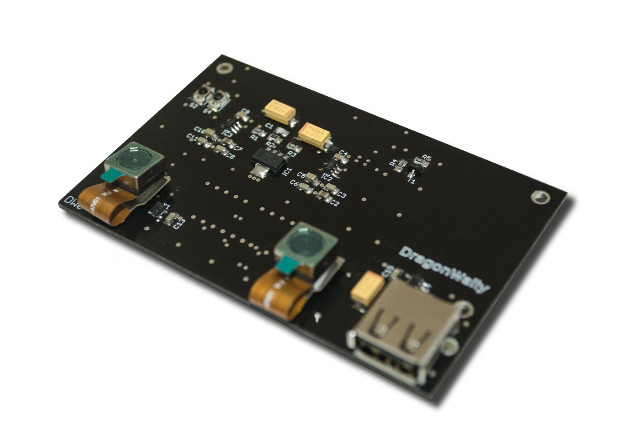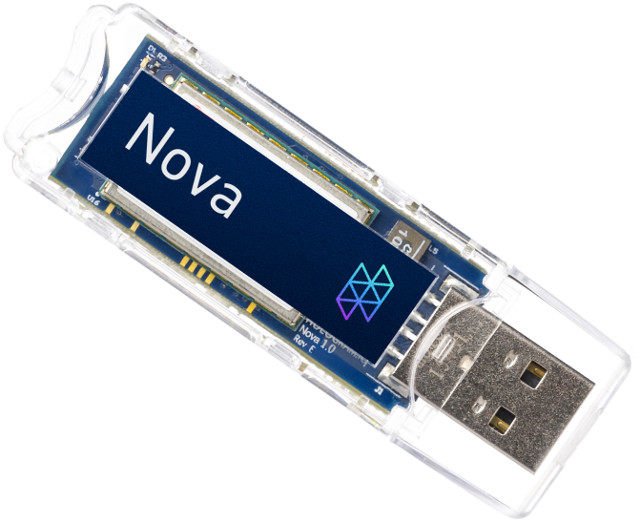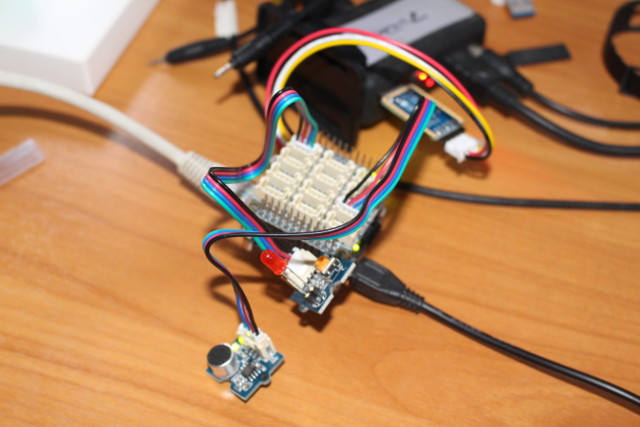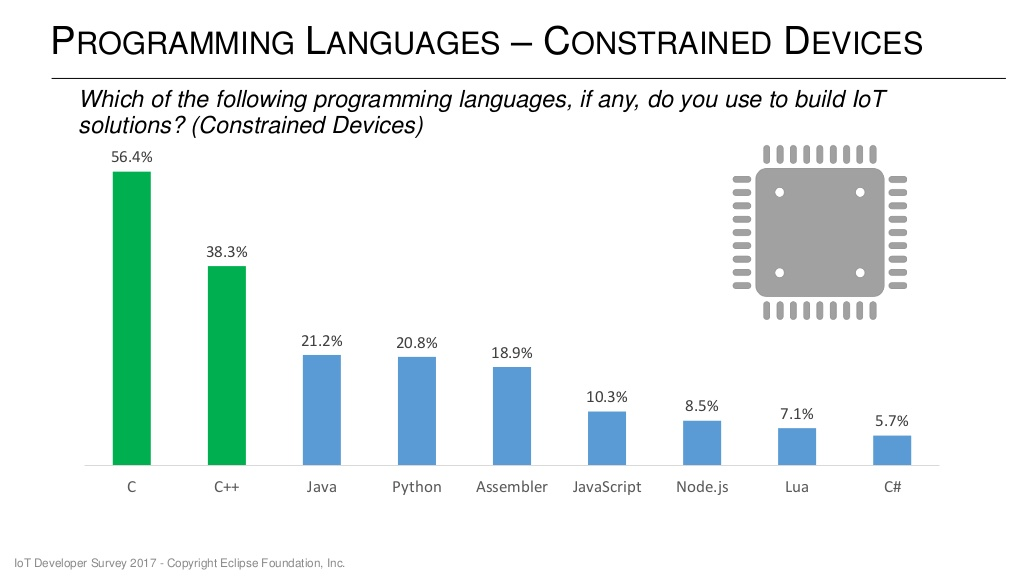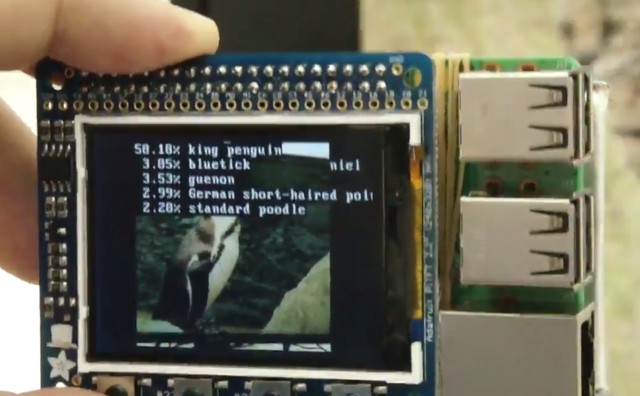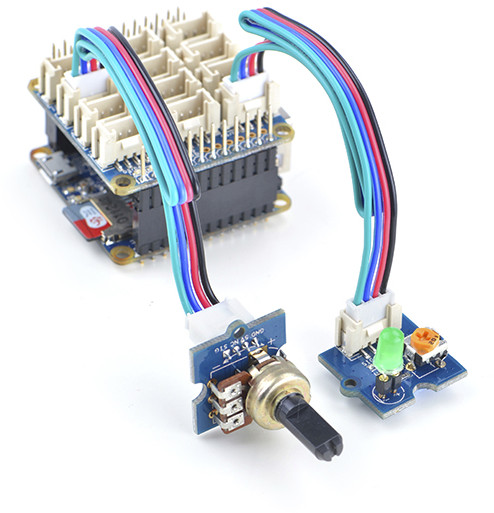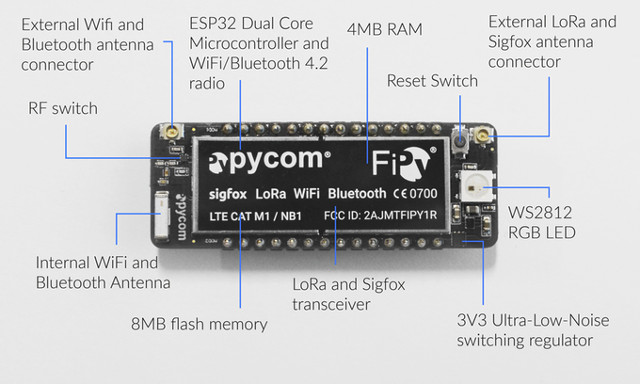Hardware based on 96Boards specifications may not have the number of sales as Raspberry Pi or Orange Pi boards, but there’s heavily used by Linaro member and other developer working on bleeding edge software. More and more companies are designing boards compliant with the standard, and several new mezzanine expansion boards such as Secure96, were showcased at Linaro Connect SFO 2017, and are yet to be show up on 96Boards Mezzanine page. Another 96Boards mezzanine expansion board in development is Dragonwally, designed for stereoscopic computer vision, currently used with DragonBoard 410c board, and targetting applications such as object recognition, people counting, access control, or driver identification and safety. DragonWally DW0 board specifications: MIPI DSI interface with high speed connector 2x 5MP cameras 1x USB port 96Boards CE compliant The two Brazilian developers working on the project interfaced it with DragonBoard 410c running Linaro Debian, and using OpenCV and Python for […]
Hologram Unveils Nova 3G USB Dongle and Python SDK; 200 Raspberry Pi Zero W Kits Given Away to Developers
This summer I discovered Hologram global cellular IoT SIM card, and since they provided free developer samples with 2MB of monthly data includes, I decided to get one to try it out. I received it a few weeks later, and to my surprise it worked, despite my country of residence having some strict requirements with regards to SIM card registration. The SIM card uses roaming, but with a low fixed worldwide pricing, and does not come with a phone number by default, so maybe that’s why I did not have to register. The company is now back with Nova, an open source hardware cellular modem certified by OSHWA (ID #US000077). It’s basically 2G/3G USB dongle that’s controlled by Hologram Python SDK, specifically suited to Debian systems like Raspberry Pi 3 or BeagleBone Black. Hackster.io is also involved in the launch with a worldwide contest offering 200 free kits comprised of […]
Using GPIOs on NanoPi NEO 2 Board with BakeBit Starter Kit
NanoPi NEO 2 is a tiny 64-bit ARM development board powered by Allwinner H5 processor. FriendlyELEC sent me a couple of NEO 2 samples together with their BakeBit Start Kit with a NanoHat and various modules via GPIOs, analog input or I2C. I’ve already tested both Armbian with Linux 4.11 and Ubuntu Core Qt with Linux 3.10, and ran a few benchmarks on NanoPi NEO 2. You would normally prefer to use the Armbian image with Linux mainline since it provided better performance, but at the time I was told GPIO support was not there. Configuring NanoPi NEO 2 board with BakeBit library So this week-end, when I decided to test GPIO support and BakeBit Starter Kit, I decided to follow this advice, especially nanopi-neo2-ubuntu-core-qte-sd4g-20170329.img.zip image is still the recommended one in the Wiki. So I went with that image. I’ll use Python examples from Bakebit library, but if you […]
Top Programming Languages & Operating Systems for the Internet of Things
The Eclipse foundation has recently done its IoT Developer Survey answered by 713 developers, where they asked IoT programming languages, cloud platforms, IoT operating systems, messaging protocols (MQTT, HTTP), IoT hardware architectures and more. The results have now been published. So let’s have a look at some of the slides, especially with regards to programming languages and operating systems bearing in mind that IoT is a general terms that may apply to sensors, gateways and the cloud, so the survey correctly separated languages for different segments of the IoT ecosystem. C and C++ are still the preferred languages for constrained devices, and developers are normally using more than one language as the total is well over 100%. IoT gateways are more powerful and resourceful (memory/storage) hardware, so it’s no surprise higher level languages like Java and Python join C and C++, with Java being the most used language with 40.8% […]
GPU Accelerated Object Recognition on Raspberry Pi 3 & Raspberry Pi Zero
You’ve probably already seen one or more object recognition demos, where a system equipped with a camera detects the type of object using deep learning algorithms either locally or in the cloud. It’s for example used in autonomous cars to detect pedestrian, pets, other cars and so on. Kochi Nakamura and his team have developed software based on GoogleNet deep neural network with a a 1000-class image classification model running on Raspberry Pi Zero and Raspberry Pi 3 and leveraging the VideoCore IV GPU found in Broadcom BCM283x processor in order to detect objects faster than with the CPU, more exactly about 3 times faster than using the four Cortex A53 cores in RPi 3. They just connected a battery, a display, and the official Raspberry Pi camera to the Raspberry Pi boards to be able to recognize various objects and animals. The first demo is with Raspberry Pi Zero. […]
$30 BakeBit Starter Kit Adds Sensors & Buttons to Your NanoPi NEO & NEO Air Boards
FriendlyElec (previously FriendlyARM) launched NanoPi NEO and then NanoPi NEO Air board as respectively Ethernet and WiFi/Bluetooth connected boards for IoT applications. But so far, there was no ecosystem around the board, you had to use your own sensor modules, and write your own software to control them. This has now changed with the launch a BakeBit Starter Kit with twelve sensor modules, a NanoHat Hub add-on board designed for NanoPi boards, as well as BakeBit Library to control the hardware. The NanoHat Hub plugs into the two NanoPi NEO headers and provide 12 headers with 3x I2C interfaces, 3x analog interfaces, 2x UART interfaces, and 4x digital interfaces among which D3 and D5 support PWM, compatible with SeeedStudio Grove modules. You then have a choice of 12 modules to connect to the NanoHat Hub: OLED Module Ultrasonic Module Green LED Module Red LED Module LED Bar Module Rotary Angle […]
39 Euros FiPy Board Supports Sigfox, LoRa, LTE Cat M1/NB1, Bluetooth 4.2, and WiFi (Crowdfunding)
Long range LPWAN solutions have just started to hit the market, and there are so many standards such as Sigfox and LoRa that it’s difficult to know who will eventually be the winner, or if different standards will co-exist over the long term, and in a general sense it might not be so easy to decide which one is best suited to your project without experimenting first. Pycom has a solution to this problem, as they’ve made a board similar to LoPy with WiFi, Bluetooth, and LoRa, but instead included 5 long and short range IoT protocols: Sigfox, LoRa, LTE Cat M1 & Cat NB1, Bluetooth, and WiFi. Pycom FiPy board specifications: SoC – Espressif ESP32 dual core Tensilica L108 processors @ up to 160 MHz with BT 4.2 and WiFi System Memory – 4MB RAM Storage – 8MB flash memory Connectivity WiFi 802.11 b/g/n @ 16 Mbps up to […]
A Closer Look at Ingenu RPMA Alternative to LoRa or Sigfox LPWAN Standards & RPMA Development Kit
I’ve recently started to write a bit more about long range LPWAN standards for IoT applications, especially LoRa and Sigfox, as commercial networks are being launched, and relatively low cost hardware platforms are being introduced to the market. There are also other highly expected standards such as Weightless and LTE Cat M that will bring more competition to the market. Ingenu RPMA (Random Phase Multiple Access) is another available standard that’s been in deployment for a while, and based on an earlier comparison of long range LPWAN standards, it comes with long range, supports up to 384,000 nodes per “sector”, operates in the unlicensed 2.4 GHz ISM band, and offers high combined uplink and downlink bandwidth than competitors. Ingenu recently contacted me and provided some more details and information about their technology and development kit. One of the documents includes an “independent analysis completed by ABI Research, Inc.” comparing features […]


